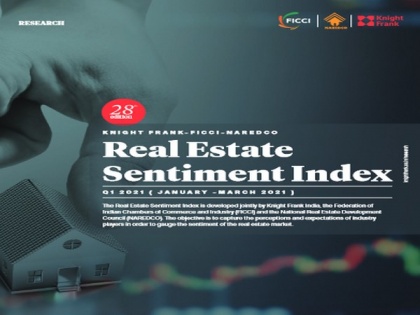Future real estate sentiment index hit by second Covid wave: Report
By ANI | Published: April 23, 2021 02:37 PM2021-04-23T14:37:40+5:302021-04-23T14:45:10+5:30
The second wave of Covid-19 pandemic has influenced future sentiments of real estate stakeholders in the country, according to 28th Edition of Knight Frank-FICCI-NAREDCO Real Estate Sentiment Index Q1 2021 survey.

Future real estate sentiment index hit by second Covid wave: Report
The second wave of Covid-19 pandemic has influenced future sentiments of real estate stakeholders in the country, according to 28th Edition of Knight Frank-FICCI-NAREDCO Real Estate Sentiment Index Q1 2021 survey.
The future sentiment score saw a decline from 65 in Q4 2020 to 57 in Q1 2021 due to uncertainties resulting from the spread of a second wave of Covid-19 infections. However, it remained in the optimistic zone.
The current sentiment score recorded a marginal improvement, inching up from 54 in Q4 2020 to 57 in Q1 2021. This improvement can be attributed to the healthy momentum in the commercial and residential real estate segments during Q4 2020 and during January to February 2021.
A score of above 50 indicates 'optimism' in sentiments, a score of 50 means the sentiment is 'same' or 'neutral' while a score below 50 indicates 'pessimism.'
Hampered by the second Covid wave concerns, the future sentiment score (for the next six months) of stakeholders has fallen across regions, even while it remains in optimistic zone.
Similarly, the Q1 2021 outlook of supply side stakeholders reflects caution on the future of real estate for the next six months even if their scores remain in optimistic zone.
With the substantial increase in Covid cases since March, the outlook for residential launches and sales softened in Q1 2021. Even so, the share of respondents that expect the residential market to grow or remain steady in the next six months is more than 80 per cent across parameters of launches, sales and prices.
Similarly, the resultant mobility restrictions and possible lockdowns in some cities has adversely impacted office occupancy levels. This has resulted in weakening of office market outlook for the next six months.
On the macroeconomic front, the pace of economic revival appears to have slowed down with some key economic indicators showing weakening over the last two months. Influenced by the change in macroeconomic developments, stakeholder outlook on overall economic momentum and on credit availability has turned cautious in Q1 2021.
"As some regions have already announced movement restrictions, it will be imperative to observe the key economic indicators in the coming months to check the sustainability of the growth that the sector has already achieved," said Shishir Baijal, Chairman and Managing Director, Knight Frank India.
"The speed at which the inoculation drive is conducted, and the intensity of local restrictions placed will be proportional to the growth of the real estate sector's growth in the coming months," he added.Niranjan Hiranand, National President of National Real Estate Development Council (NAREDCO), said as the influx of private equity and foreign direct investment is on rise, the sentiment remains bullish for Indian economic outlook.
"The growth of Indian real estate is imperative due to its multiplier effect on 270 ancillary industries and employment generation. The dip in the future sentiment score in Q1 2021 mirrors prevalent market uncertainties on account of second Covid wave. However, there is no cause of worry for the industry as it is well-geared to mitigate the risk on ground."
( With inputs from ANI )
Disclaimer: This post has been auto-published from an agency feed without any modifications to the text and has not been reviewed by an editor
Open in app